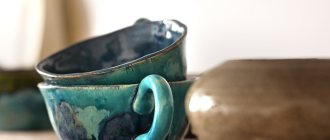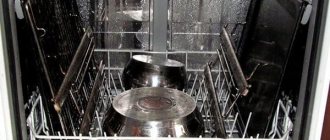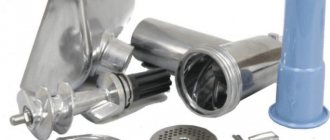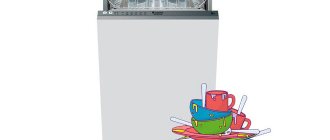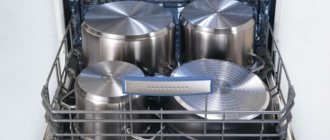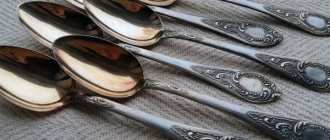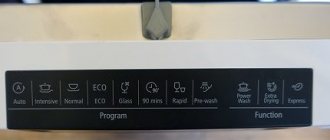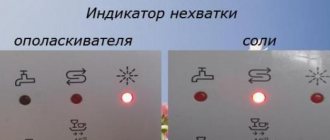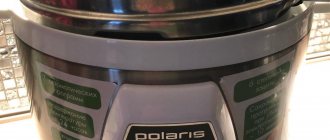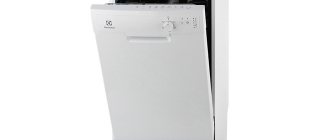When you purchase a dishwasher, you often feel the urge to wash everything you can get your hands on. But some dishes and kitchen utensils absolutely cannot be washed in the PMM. Thus, aluminum cookware runs the risk of deterioration in the dishwasher. Why this happens and how to deal with the consequences will be discussed in this review.
Reasons why you should not put aluminum in PMM
Aluminum is a fairly active metal that reacts with many substances and even with water, under certain conditions. Such conditions are created inside the dishwasher. On the surface of this metal there is a dense oxide film that is easily dissolved by alkalis. Many dishwasher detergents contain alkalis; thanks to them, dishes are washed without physical impact.
So, under the influence of alkali in hot water, the oxide film is removed from the surface of aluminum cookware. As a result of this, aluminum is able to react with water, which leads to the destruction of this metal and the appearance of a dark coating on its surface . If you expose dishes to this effect for a long time, they will not only become dark, but will also begin to deteriorate. Some people note that after washing the dishes at 35 degrees, nothing happened at all, but we warn you once again, after several such washes, the dishes will still darken. And perhaps forever.
Important! Scientists have proven that aluminum cookware cannot be used. Metal enters the human body in large quantities, negatively affecting the functioning of all organs without exception.
Hand dishwashing detergents are less harsh, so we don't notice any changes with aluminum cookware. However, with prolonged use, the darkening effect still appears. So, let's conclude that aluminum cookware should not be put in the dishwasher because:
- it loses its appearance, acquiring a dark coating;
- it is not safe for health.
What to do with darkened dishes?
It’s clear why it’s forbidden to wash aluminum in the dishwasher. But not many people remember chemistry lessons, not everyone reads the instructions for dishwashers, and not all instructions contain a note that aluminum dishes cannot be washed, and some even accidentally put such products in the tank. On thematic forums, users write about how they were spoiled:
- pots;
- frying pans;
- garlic presses;
- spoons;
- parts from a meat grinder.
Therefore, the question arises: is it possible to restore aluminum cookware to its former shine and attractiveness? It’s not that simple and will depend on how much the color of the item has changed. The protective layer of metal is not destroyed immediately; the hotter the water and the more alkali in the detergent, the faster the dishes will darken and become covered with a gray coating. Of course, the damaged dishes should be thrown away, but sometimes this is not possible, especially if they are parts from a new meat grinder. How then can you remove plaque?
How to restore darkened aluminum
If you did not know that aluminum is not intended for washing in PMM, and it has darkened, do not despair. Accidentally washed aluminum products: a pot, a frying pan, a garlic press, cutlery or meat grinder parts? You can try to bring them back to life. It is important how dark the products are - not everything can be restored.
How to wash dishes, what to do to cope with dark stains? Start with manual cleaning using specialized products.
Do not trust “folk” methods: do not, on the advice of grandmothers, boil dishes with washing powder and soda - it will only make things worse.
Try the following if your aluminum has oxidized:
- Clean and polish the products using GOI paste. Apply the substance to a felt piece or napkin and rub the device.
- Polish damaged utensils with Dialux special paste.
- Treat the damaged areas using HOPC automotive rust converter, then polish with any of the above products. It is recommended to resort to this method when other methods have failed.
You can try to clean aluminum after dishwashing with nitric or sulfuric acid, but this is not safe. Weaker acids, such as citric or acetic acids, are unlikely to cope.
Important! Even when hand washing aluminum cookware, avoid regular detergents. Use special gels and powders for aluminum or a bar of kitchen soap.
Is the harm of aluminum cookware real?
Yes, it is already difficult to dispute the harm to health from an excess of aluminum. However, these complications arise only if the amount of this metal in the body significantly exceeds the norm. How large is the amount that enters the body when eating food from aluminum dishes? And does aluminum get in at all?
Opinions on this matter vary. Scientists have found that when heated, aluminum cookware releases a certain amount of aluminum. In addition, upon contact with certain types of food, it reacts, as a result of which this metal is also released. I mean, yes, aluminum stands out.
And therefore, yes, when eating food from aluminum cookware, metal gets inside. Because of these facts, scientists raised the alarm and began to seriously warn about the dangers of using aluminum cookware.
However, further research has led some scientists to doubt that panic is worth raising.
The fact is that the acceptable dose of aluminum that a person can receive per day is 30–50 mg. Meanwhile, a maximum of 3 mg of aluminum is eaten with food from aluminum cookware. This dose is not critical and is unlikely to harm human health. Yes, there will be no benefit from this, but there will be no harm either.
To summarize: you can cook in aluminum containers without fear for your health. However, be careful.
You should not store food in it, especially those that contain salts or acids: in a word, anything that can cause a reaction.
What methods are not suitable for cleaning?
When trying to renew aluminum products, avoid the following cleaning methods:
- Set aside the metal jaws and stiff brushes.
- Powders with abrasive particles are prohibited.
- Don't use chalk, sand or sandpaper - you'll only make things worse.
- Do not try to remove carbon deposits with sharp objects such as knives or forks. For these purposes, use plastic or silicone spatulas.
Stop list for dishwashers
Regardless of the material, it is prohibited to wash dishes or any items with stickers in the dishwasher. These pieces of paper will definitely “peel off” from the surface being cleaned and end up in the filters.
The consequences are predictable - the PMM will most likely break immediately. It’s good if the automatic safety system works, otherwise you’ll have to call a specialist to repair the equipment or send it for service.
Aluminum and silver products
Hot water in PMM aluminum and silver is not dangerous. However, the household chemicals used for washing are extremely harmful to them. After being in the dishwasher, utensils made from these metals begin to darken and become coated.
When exposed to water for a long time, aluminum releases ions. If you put a lot of aluminum cookware in the dishwasher for two to three hours at the same time, then everything inside will be “painted” with a corresponding metallic coating.
Moreover, aluminum will not only cover the internal walls of the PMM, but can also clog the nozzles on the sprinklers. Breakdown and subsequent repair of the dishwasher in this case is inevitable.
A video with visual explanations of why you can’t wash aluminum kitchen utensils in a PMM:
Wooden and cast iron objects
Wood and water are not very compatible materials. It is better to wash wooden spatulas, cutting boards and rolling pins yourself. They in PMM will first swell from excess moisture, and then shrink under the influence of high-temperature air drying.
The result will be cracked utensils, unsuitable for further use for their intended purpose. Nowadays, many wooden cutting boards are made not from a single piece of wood, but from glued pieces. If such a prefabricated product is kept in water for a long time, it may fall apart into individual elements.
And even if it doesn’t fall apart, it will definitely come apart in the glued areas. In this case, the consequences are even worse - the glue from the board will subsequently enter the body with food.
Cast iron frying pans, cauldrons and kettles become covered with a thin film of fat over time. It protects this metal from water and oxygen, which prevents the formation of rust on such utensils.
With manual washing, greasy deposits are never completely washed away, but with automatic washing with a large amount of detergent, it disappears. And then the unprotected cast iron begins to rust.
Knives, strainers and garlic presses
Knives made of stainless steel become slightly dull after a long stay in the dishwasher. That is, the material itself is not afraid of PMM. However, the knife will have to be sharpened again after such a wash.
This also applies to graters and any other utensils with a sharp edge for cutting food. They can not only become dull, but also scratch the internal walls and mechanisms of the washing machine.
Strainers, graters, vegetable cutters and devices for cutting food into shapes will have to be washed by hand. They have a lot of small nicks and grooves, where particles of vegetables, fruits, meat, etc. remain after cooking. The jets sprayed by the nozzles in dishwashing equipment are not able to wash away such “crumbs”. They can only be cleaned manually.
It is also not recommended to put knives and other parts of the meat grinder in the dishwasher. On the one hand, the cutting edges will become dull, and on the other, the metal from which this machine is made will oxidize. Then you will have to clean the blackened surfaces with abrasive powders by hand.
Thermos and crystal products
Often thermoses are designed in such a way that the flask is wrapped in heat-insulating material. However, when wet, thermal insulation not only loses its properties, but also deteriorates. Plus the effect of chemicals from “soap” with unclear consequences. Even after complete drying, the insulation will not retain heat as well as before.
The thermos should be washed exclusively by hand. You cannot place it in water or steam for a long time. Moreover, it is not recommended to do this, even if it does not have a heat insulator.
There is always empty space between the outer casing and the bulb. If you do not disassemble it, the water that gets there will not dry completely. And the result is an unpleasant musty amber.
Some crystal items can be washed in the dishwasher. However, not all: there are many different types of crystal, and most of them are contraindicated at temperatures above +50 C. The consequences of such heating are microcracks inside the crystal glass. For crystal products, expensive PMMs have special programs.
It is allowed to place crystal dishes in cheap dishwashers only if this is permitted by the manufacturer of such dishes. The packaging of this product must clearly indicate “allowed.”
If you don’t have a box for a crystal vase at hand, then it’s not worth the risk. Crystal may crack or become dull and cloudy when heated. But it certainly won’t become more beautiful after washing it in a machine with specialized products.
How aluminum affects the body's functioning
- It turned out that aluminum changes the energy exchange in cells, and this leads to their uncontrolled reproduction. And chaotic cell proliferation leads to the formation of tumors. It can also accumulate in the body, which ultimately leads to serious consequences. There are many such consequences.
- Excess aluminum disrupts a serious function of our body - metabolism. In addition, it negatively affects the nervous system, removes calcium from the body, interferes with hemoglobin synthesis and causes bone damage. Aluminum poisoning leads to the development of osteoporosis and impaired renal function.
It is especially dangerous to expose children to aluminum. This affects them with increased excitability and hyperactivity, and sometimes leads to headaches, anemia, kidney and liver diseases.
- Aluminum also has an extremely unpleasant effect on older people: it causes memory loss and develops dementia. Some studies have even found a link between excess aluminum and Alzheimer's disease. True, the last hypothesis was subsequently refuted, although some scientists continue to believe in it.
What can be washed in the dishwasher
Items that can be washed using this technique are usually indicated in the instructions. However, many users either immediately throw away this unnecessary waste paper, or turn to it only when something has already broken.
Just in case, let us remember that you can find instructions for any model on the manufacturer’s website or upon request to the official address of the company that manufactured your dishwasher.
Thus, the machine can be used to clean the following types of dishes:
- Ceramic, porcelain and earthenware
- if there are no patterns or gilding on it. Utensils made from such materials are strong enough to withstand hot water and any detergent. But due to frequent washing in the machine, the patterns and borders can be damaged or even erased, significantly worsening the appearance of the product. Therefore, it is best to load only single-color ceramic plates, saucers and cups into the sink. - Silicone.
Moreover, we are talking not only about baking dishes made from this material, but also about spatulas. Items made from synthetic food-grade rubber are easily washed off from dirt and do not harm the dishwasher - just like it does to them. - Glass.
Including glasses, cups, dishes, plates and pans and baking dishes made from heat-resistant glass. To ensure that glassware not only cleans well, but also shines, you should add a special rinse aid to the detergent. - Made from enameled or stainless steel.
The dishwasher is suitable for washing steel pots, ladles, sauté pans, cutlery and oven parts, including baking sheets and racks. It will be possible to clean kitchen appliances made from the same materials - but only if this option is indicated in the instructions. For example, most parts of blenders, mixers and food processors - whisks, knives and bowls - can be placed in the dishwasher.
What can't you clean aluminum with?
How not to clean aluminum
When working with cookware and other products made from this metal and its alloys, under no circumstances
should you
use abrasive agents.
Interesting materials:
Is it possible to plant peppers after tomatoes? Is it possible to plant petunia directly in the ground? Is it possible to plant peonies next to hydrangea? Is it possible to plant peonies with hydrangea? Is it possible to plant peonies with lilies? Is it possible to plant peonies at the end of September? Is it possible to plant fruit trees next to a birch tree? Is it possible to plant sunflower seedlings? Is it possible to plant tomatoes after strawberries? Is it possible to plant tomatoes after tomatoes?
What other dishes are prohibited from being placed in the PMM?
We have already written about what dishes should not be washed in the dishwasher, but since we are talking about aluminum, let us remind you that you should not put the following items in the bin together with it:
- Wooden utensils, knives with wooden handles, etc. The tree swells and cannot be restored, as it irretrievably loses its appearance.
- Dishes made of silver and cupronickel - they darken, just like aluminum.
Important! Some manufacturers, such as Neff, offer the buyer a lot of accessories for dishwashers, among which you can find containers for washing silver.
- Teflon pans - the non-stick properties are lost in the dishwasher. An exception is cases when the packaging has an icon that allows the product to be washed in a PMM.
- Knives - in hot water they begin to dull quickly.
- Porcelain (especially luxury) - it can darken and stop shining.
When washing any dishes and utensils, you should monitor the temperature of the water in the selected mode and correctly arrange the dishes in the baskets. Even ordinary plates can be damaged if washed in boiling water with a high concentration of harsh chemicals.
Dishes prohibited for washing
Not only aluminum objects are incompatible with PMM processing: there are also other substances that are sensitive to aggressive chemicals and high temperatures in the washing chamber. Some products made from such materials may lose their original appearance irrevocably.
It is prohibited to place in the automatic washing machine:
- objects made of wood or with elements of decoration of plant origin - they will swell and crack after drying;
- silver dishes, cupronickel items - you will have to restore the darkened surface to restore its former shine;
- frying pans with Teflon coating - during the washing process, the non-stick film may disappear (except for dishes marked with a machine-cleanable icon);
- knives - they are washed only with cold water: after hot processing, the blades will have to be sharpened;
- products made of bone, fine porcelain - lose their luster and darken.
Dishwashers vary from manufacturer to manufacturer. To avoid mistakes when placing cutlery in the chamber, you must first read the operating instructions for a particular model.
It provides recommendations on temperature conditions and dosage of detergents. It also contains a warning about types of cookware prohibited from machine processing, including aluminum, which is included in the list at number one.
Video
Is it possible to cook jam in an aluminum container?
Cooking regular food is one thing. But whether aluminum cookware is suitable for making jam or not is a separate question. What is the difference between jam and other foods?
The answer is simple: jam consists of berries, and berries contain acid. As already noted, aluminum can easily react with acid, which can lead to unpleasant consequences.
However, to the question “is it possible to cook jam in an aluminum pan?” the answer “yes” is also possible. If you don’t have any other suitable utensils at hand, then yes, you can make jam in aluminum. The main thing is not to leave it in the pan, this will not benefit either the jam or the dishes. In addition, after cooking, you need to pour it into another container, and wash the dishes in which the cooking took place thoroughly.
To summarize, it is worth saying that aluminum cookware has its pros and cons. You cannot cook or store some food in it. It is dangerous to wash it in the dishwasher. But it is light, comfortable and durable. If used correctly and carefully, it will serve you for a long time.
